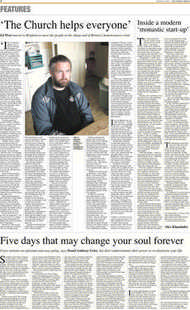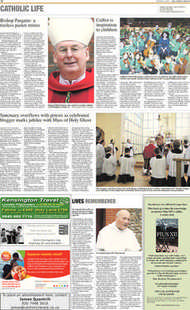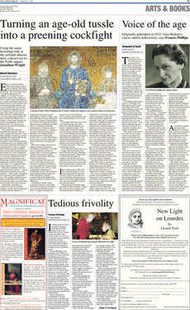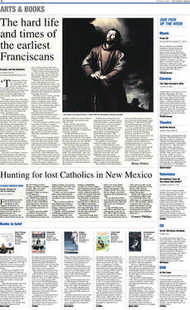Page 1, 14th August 2009
Page 1

Page 12
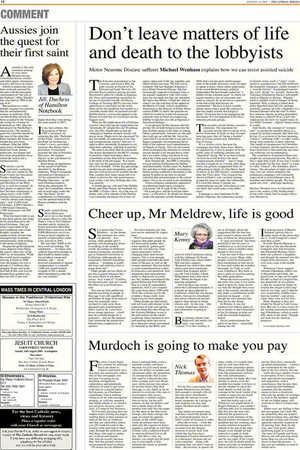
Report an error
Noticed an error on this page?If you've noticed an error in this article please click here to report it.
Tags
Share
Related articles
Church At Odds With Doctors Over Suicide Case
Peers Urged To Vote Against Euthanasia Bill
Blair Urged To Change Euthanasia Bill
Assisted Suicide Bill Wrecked By The Lords
Bishops Awaken 'sleeping Giant Of The Laity' Over...
Resist suicide law changes, archbishop urges faithful
BY SIMON CALDWELL
A SENIOR archbishop has called on Catholics to do their utmost to try to prevent the laws forbidding assisted suicide from being watered down.
Archbishop Peter Smith of Cardiff said sick and disabled people would come under pressure to kill themselves if the law on assisted suicide was relaxed following a landmark House of Lords ruling.
He said he had “serious concerns” about the implications of a demand by five Law Lords for a clarification of the law on assisted suicide.
“There is a danger of subtle pressure being felt by those who are vulnerable that they are unwanted or a burden to others – those with disabilities and chronic illness especially,” said Archbishop Smith, the vice-president of the Bishops’ Conference of England and Wales and chairman of the bishops’ Department for Christian Responsibility and Citizenship.
He said it was vital that Catholics made a full contribution to a consultation process planned for the autumn ahead of the publication of clear rules on helping people to travel abroad to kill themselves.
His comments came after Debbie Purdy, 46, a multiple sclerosis sufferer from Bradford, West Yorkshire, persuaded the Law Lords to clarify whether her husband, Omar Puente, would be prosecuted under the 1961 Suicide Act if he accompanied her to the Dignitas death clinic in Switzerland. More than 100 Britons have killed themselves there but no one has been prosecuted for helping them although aiding a suicide is punishable by up to 14 years in prison.
The Law Lords decided that the right to respect for private life, enshrined within Article 8 of the European Convention of Human Rights, also covered a person’s choice to end his or her life. Keir Starmer, the Director of Public Prosecutions, will now have to spell out exactly how the law will be interpreted in future.
The churches are vehemently opposed to the euthanasia and assisted suicide because they represent a direct violation of the divine commandment not to kill, but Archbishop Smith said the ruling raised serious public safety as well as moral issues.
“From a moral perspective all are equal in dignity and the protection of the lives of citizens, especially the most vulnerable, has to remain the foundation of the law,” he said.
“It is important that those of us concerned about where this guidance could lead should contribute fully to the consultation. We need to try in particular to ensure that there is no suggestion that certain classes of people have lives that are less worth living or less deserving of the full protection of the law.” He added: “In coming years our society will have a growing number of older people dependent on others. These demographic changes raise profound and complex social, economic and moral questions. As a society we urgently need to recover respect for the lives of older people and make the necessary investment in their care, including palliative care at the end of life so that no one feels impelled to seek assistance in suicide through feelings of worthlessness or fears of unbearable suffering.
“It will be important that all those concerned for the common good, including the Catholic community, not only take part in the consultation on the DPP’s guidance, but also work for a change of mind and heart in our society so that our quality of care for those who are disabled, old and vulnerable is greatly improved.” The ruling by the Law Lords has been hailed as a victory for campaigners seeking to change British laws prohibiting euthanasia and assisted suicide.
Some campaigners have openly supported involuntary euthanasia, with the medical ethicist Baroness Warnock stating publicly last year that she believed people who were mentally incapacitated have a “duty to die”.
Don’t leave matters of life and death to the lobbyists
Motor Neurone Disease sufferer Michael Wenham explains how we can resist assisted suicide The Falconer amendment to the Coroners and Justice Bill, the joint suicide in Zurich of Sir Edward and Lady Downes, Dr Michael Irwin publicly paying towards Raymond Cutkelvin’s death at Dignitas, the Times poll purporting majorities in favour of assisted suicide, the Royal College of Nursing (RCN) moving from opposition to neutrality on the issue: these all hit the headlines last month in a veritable media blitz on assisted suicide. Debbie Purdy’s successful appeal to the House of Lords has of course proved the biggest story.
What are the implications for a Christian country? And what are the implications for “terminally ill” people like me? If nothing else, this blitz should alert us that the campaign to legalise assisted suicide will not go away. Ought we to be concerned? Is this not simply an expression of our free and compassionate society? And isn’t it right to allow terminally ill patients to cut short their suffering, with help if need be?
We need to do more than be concerned. The lesson illustrated by the RCN’s change of position, which took place after a consultation of less than half its members, is the truth of the old adage: “It is necessary only for the good man to do nothing for evil to triumph.” Of the tiny percentage (under one per cent) responding, only 49 per cent were in favour of assisted suicide. One wonders how many nurses left it to others to answer, for very good reasons, such as they were busy looking after very sick patients.
A month ago my wife and I met Debbie Purdy and Omar Puente, her husband, for the BBC’s Politics Show. As is the way of things, only a few minutes of the filming was eventually broadcast, but in fact we spent a large part of the day together, and talked almost non-stop. We had a lot in common. She has Multiple Sclerosis; I have Motor Neurone Disease. She has fantastically supportive husband; Jane is my equally supportive wife. Our conditions are not rapid, but they are relentless. We had a real affinity. I liked her. And so when I saw the outcome of her appeal to the House of Lords, with its unanimous instruction to the Director of Public Prosecutions (DPP) to clarify the grounds on which he would or would not prosecute someone such as Omar accompanying Debbie to take her own life at Dignitas, I had mixed feelings.
I was pleased for her, because she had put her life on hold trying to exorcise the fear of either going to die alone or risking Omar’s prosecution. And now, as she said, she could get on with her life. Yet at the same time I was aware that it was part of a bigger campaign. Accompanying her in front of the cameras was a representative of Dignity in Dying. This was not merely about accompanying someone to commit suicide abroad, even though that is what the Law Lords’ ruling was about. It was about the whole issue of assisted suicide.
Keir Starmer QC, the DPP, is intending to issue interim clarification for Debbie (and presumably similar cases) by September, and then to hold a public consultation before issuing a definitive document in the spring. It seems to me that we should welcome that and participate in the consultation. This is an occasion to do something.
From a religious standpoint, opposition to euthanasia might seem a foregone conclusion: life is a gift of the Creator. “The Lord gave; and the Lord has taken away,” as Job puts it. So should we demonstrate with placards outside Parliament? Well, that’s not the most useful engagement in the public discourse, since we need to speak in terms which others understand. In his recent Reith Lectures, political philosopher Michael Sandel called for “a politics of the common good” in which we regard ourselves less as consumers and more as citizens. In an answer to a question at the end of the third lecture, he commented: “We have to have a public debate about what a good life consists in and not simply assume that longer is better.” Everyone has to be engaged in the discussion. It is too important to be left to minority pressure groups.
The assisted suicide debate concerns emotions. The argument for assisted suicide derives much of its power from fear. It feeds on fear of experiencing pain, fear of “being a burden”, fear of losing control and, ultimately, fear of dying.
It’s a vicious circle, because the campaign also fuels those fears. Hence no opportunity is lost to project on to the public tales of suffering patients and “dignified” dying. We’re invited to think: “It must be awful if that’s the most compassionate solution” – and to imagine that it might be us. I recall, after diagnosis, my grossly exaggerated fears of suffocating to death. As Dan Berry, head of policy at the MS Society, commented after the Times poll: “Our research has shown palliative care can help manage symptoms that can make life unbearable. It’s a terrible shame if people are contemplating suicide when there is care out there that could make a big difference.” Language is also important in the debate. Dignitas, the euthanasia facility in Zurich, terms itself a “clinic” (with positive connotations), but David Morris, the disability champion, starkly termed it a “suicide factory”. Campaigners prefer the word “dying” to “suicide” (hence the Voluntary Euthanasia Society rebranded itself as Dignity in Dying). “Dignity” itself is another word in danger of being hijacked. Why is taking a lethal dose more dignified than bravely, perhaps painfully, putting up with a disability or a terminal disease until the end? Is there less intrinsic dignity in being dependent than being in control? If so, it has dire implications for how we regard many of our fellow humans – dignity being rooted in worth.
And finally, the concept of “compassion” is commonly bandied about as a reason for letting someone take their life. In fact it’s a reversal of its true meaning, which is “suffering with”; in other words, being with someone in their suffering. The model of compassion for Christians is Christ himself, and the hard lesson we learn from him is that enduring and sharing suffering can be redemptive.
My experience of terminal illness has taught me unexpected lessons. My life is less a right than a gift. Every day I awake with gratitude for the day. And I’ve come to value “chance”, the unbidden, above choice. The elevation of rights and autonomy over all, which underpins the euthanasia campaign, will ultimately impoverish us and endanger many ill, disabled and elderly people. We must speak out, now – and keep speaking.
Michael Wenham lives in Oxfordshire and is the author of My Donkeybody – living with a body that no longer obeys you (Monarch)
blog comments powered by Disqus









